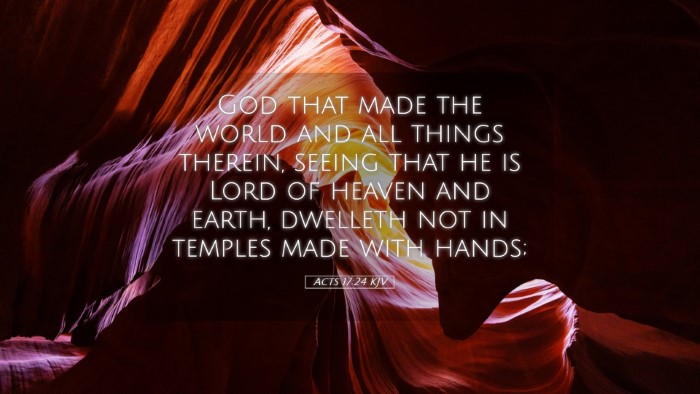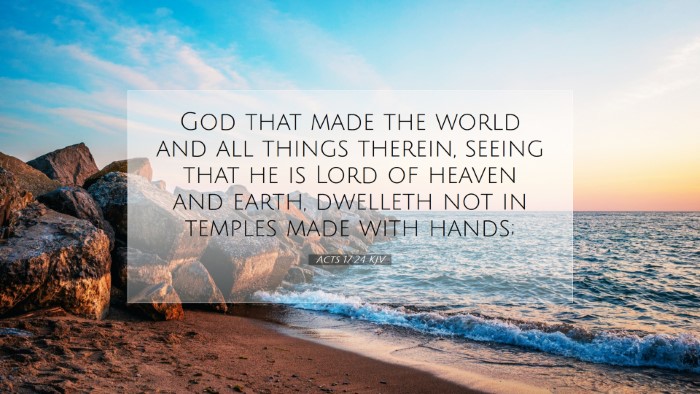Commentary on Acts 17:24
Verse: "God, who made the world and all things therein, seeing that he is Lord of heaven and earth, dwelleth not in temples made with hands."
Introduction
The verse from Acts 17:24 speaks profoundly about the nature of God as Creator and His relationship to His creation. This phrase is situated within the context of Paul’s address to the Athenians, a significant moment where he confronted the philosophical and religious ideas of a society steeped in idol worship.
The Nature of God as Creator
Insight from John Calvin: Calvin emphasizes the majesty of God as the Creator of both the heavens and the earth. This asserts God’s sovereignty over all creation, indicating that nothing exists outside His will. The acknowledgment of God as the Creator serves as a foundation for true worship, as it aligns believers’ understanding of God’s greatness with their responses of reverence.
Insight from Matthew Henry: Henry presents a view of God as transcendent, a Being who oversees and governs all creation. He notes that God’s authority is not partial but total, encompassing everything that exists. The phrase “all things therein” indicates that every aspect of life and creation is under God’s providential care, which should inspire trust and faith in His governance.
God as Lord of Heaven and Earth
Alfred Barnes’ Commentary: Barnes points out that the reference to God as “Lord of heaven and earth” highlights His jurisdiction over both the spiritual and physical realms. This is crucial as it counters the local deities that the Athenians worshipped and asserts the universality of God’s reign. It reminds believers that their God is not confined to temples or specific geographical locations.
Adam Clarke’s Commentary: Clarke adds that understanding God as the Lord of all implies an omnipresence and omnipotence that challenges man-made boundaries. He argues that God's essence cannot be contained within physical structures, which was a radical idea in a culture that revered temples. This statement should encourage believers to understand worship as a spiritual act that surpasses physical spaces.
God Dwells Not in Temples Made with Hands
Theological Implication: The assertion that God dwells not in temples made with hands carries significant theological weight. It challenges the Athenians' reliance on physical idols and structures for their religious practices. The implication is that God’s presence is not limited to man-made constructs but is freely accessible to those who earnestly seek Him.
Matthew Henry’s Exposition: In his exposition, Henry notes that this declaration encourages believers to recognize the spiritual essence of worship, which involves sincerity and truth rather than merely ritualistic procedures in buildings. Worship is not defined by physical structures but by the hearts of those who worship.
Albert Barnes’ View: Barnes emphasizes that this statement illustrates the futility of idol worship, as the true God cannot be reduced to material forms. He argues that the presence of God is rather found in the lives of His people and in their collective worship, which transcends any physical location.
Application for Believers
For pastors and theologians, Acts 17:24 urges a shift from viewing worship as an event confined to a particular place to understanding it as a lifestyle that integrates both faith and action. The modern church must navigate a world where physical manifestations of faith sometimes overshadow spiritual authenticity.
Practical Insights:
- Encourage congregations to seek God personally, recognizing that they can encounter Him anywhere.
- Promote discussions on the importance of spiritual formation over mere attendance in church buildings.
- Challenge believers to reflect on their conceptions of worship, urging them to move beyond ritualistic practices to a genuine relationship with God.
- Facilitate community worship outside traditional spaces, demonstrating the omnipresence of God in various contexts.
Conclusion
In summary, Acts 17:24 serves as a powerful reminder of the nature of God as transcendent Creator and sovereign Lord. It challenges false notions that God can be confined to temples made by human hands. For contemporary believers, this verse invites a deeper exploration of the nature of worship as a fundamental aspect of their faith experience and daily lives. It beckons them to understand the boundlessness of God and the accessibility of His presence, urging a life that reflects this truth in every moment.


